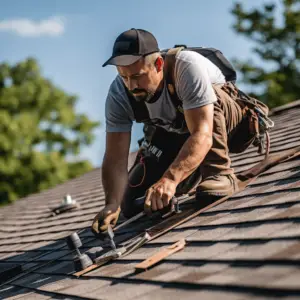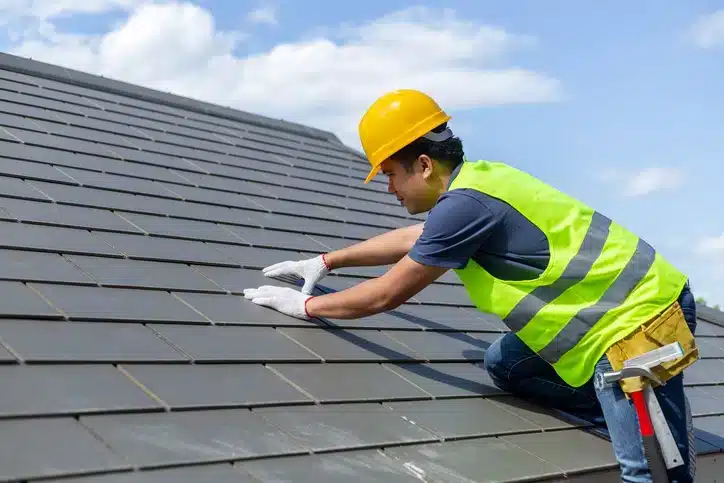Insurance Checks, If you are a homeowner, it is essential that you get your home to be insured by an insurance provider or company. The first thing you need after purchasing a home is that.
When your property is insured, you can relax knowing that you have the option to file an insurance claim if you need to make specific repairs around the house or enter into a repair contract. A new roof contract is one of these contracts under which you have the right to file an insurance claim.
It is a well-known fact that roofing businesses train their contractors to request insurance claims as soon as the homeowner signs the contract. Who doesn’t like to get paid before they finish the job? Insurance Checks, but is it the right move to sign your insurance check over? When can you sign over an insurance claim? Why does the roofer request that you sign over the insurance claim? This article’s goal is to provide the answers to these pressing queries.
Table of Contents
What Should You Do if a Roofer Wants You to Sign Over the Insurance Check?

If you recently signed a contract with a roofing company, do not sign your insurance claim to the contractor.
Giving the contractor management of your insurance claim is rarely a good idea, especially if the job isn’t finished or if there are no signs the contractor is ready to start.
However, the circumstances may alter frequently, and the answer may differ.
This suggests that giving the contractor your insurance claim can be beneficial or negative.
Two Types of Insurance Policies
Before diving into the many circumstances in which it is acceptable to turn over your insurance claim to the contractor, it is essential to understand different types of insurance policies.
There are two types of insurance policies: Actual Cash Value (ACV) and Recoverable Cash Value (RCV).
With the ACV, your insurance claim would be sent to you at the start of the roofing project in a single check. The ACV is your insurance claim less your deductible and any depreciation your roof may have accumulated before the loss.
As the homeowner’s premiums do not take into account the depreciation on the roof, which is why it will be subtracted from the insurance claim by the insurance providers, ACV is typically less expensive than RCV.
Depreciation, however, is taken into account by the RCV. Simply put, the RCV is your insurance claim, less your deductible.
There are two checks for this insurance claim. The first check is the actual cash value made at the contract’s start and the recovered depreciation amount sent after the contract’s completion.
When is it Acceptable to Sign Your Insurance Check Over to the Roofer?
If the initial check is less than 50% of the roofer’s RCV building expenses, you can give him your insurance check.
Proof your roofer is ready to work. Proof that the roofer has provided goods to start work shouldn’t be overlooked because, less than 50% of the time, your roofer may not work after you sign your insurance claim. You can sign your insurance claim to your roofer if you’ve worked with them before and are in good faith. Signing an insurance check above the roofer’s repair estimate is wrong.
When Should You Not Sign Your Insurance Check Over to the Roofer?

You should not give the roofer your insurance check in some cases. First, never sign your insurance check to the roofer if they haven’t promised to start work immediately.
When there is no physical evidence, such as his bringing building supplies to your house to start construction. If there is no sign that he wants to work right away, don’t fork over your insurance check, even if it’s less than the first payment.
Second, do not sign your insurance check over to the roofing contractor if it exceeds 50% of the first payment requested. If you have RCV coverage and your initial insurance payment is $50,000 but the roof costs $70,00, you will receive $50,000.By signing the check, you give the roofer over half the job’s cost.
Your Insurance Check
After providing him over half the repair cost, there are no guarantees that the work will be done efficiently or at all. Finally, don’t give your roofer the insurance check if it exceeds the amount of your new roof, regardless of completion. Roofers may persuade homeowners to sign the insurance check, regardless of the amount, then divide the difference and refund the balance.
Since the check is not personal and you cannot remember it, these roofers often leave with the remaining money, leaving you with an unneeded loss and regret that your insurance company cannot recover.
Insurance Checks insurance check exceeds the roofing job’s cost, don’t give it to the constructor. Manual activities are best; cash the check and pay the roofer.
Final Take
When dealing with roofing contractors or builders in general, it is vital to be cautious because no one wants to become a victim of fraud. We hope the article has offered useful tips on when and when not to sign your insurance check to the roofer. These tips will prevent you from being a victim of fraud.


